Ancient Quotations
What Did Socrates Say About Living an Inspired Life?

Have you ever wondered about the advice Socrates gave on living a life filled with inspiration? Let me share some fascinating insights from this renowned philosopher.
Socrates, an ancient Greek thinker, believed in the power of self-reflection and the pursuit of wisdom and virtue. He encouraged us to question our assumptions and beliefs, urging us to embrace the examined life. Through engaging in dialogue and seeking knowledge, Socrates taught that we can find meaning and fulfillment in our existence.
He emphasized the importance of ethics and virtuous actions, as well as the development of critical thinking skills. In this exploration, we will delve into Socratic principles and discover how they can be applied to our everyday lives.
Key Takeaways
- Self-reflection and personal growth play a vital role in living an inspired life.
- Pursuing wisdom and virtue through continuous learning and embracing new perspectives is essential.
- Questioning assumptions and beliefs leads to intellectual growth and moral development.
- Embracing the examined life requires self-awareness, introspection, and a commitment to personal growth.
The Importance of Self-Reflection
In the article, we’ll explore the significance of self-reflection in living an inspired life, as emphasized by Socrates. The importance of self-reflection can’t be overstated, as it plays a vital role in our personal growth and development. It’s through self-reflection that we gain a deeper understanding of ourselves, our thoughts, and our actions. This process allows us to examine our beliefs, values, and biases, enabling us to cultivate intellectual humility.
Self-reflection allows us to step back from our daily routines and engage in introspection. It’s a practice that encourages us to ask ourselves tough questions and critically evaluate our choices. By doing so, we become more aware of our strengths and weaknesses, allowing us to make informed decisions and take purposeful actions towards personal and professional growth.
Cultivating intellectual humility is an essential aspect of self-reflection. It involves recognizing that we don’t possess all the answers and being open to new perspectives and ideas. Intellectual humility allows us to embrace the concept of lifelong learning and encourages us to seek knowledge and wisdom from various sources.
As we delve deeper into the pursuit of wisdom and virtue, we’ll see how self-reflection serves as a foundation for these endeavors. Self-reflection allows us to become aware of our own ignorance and acknowledge that there’s always more to learn. It’s through this process that we can continuously strive for self-improvement and the cultivation of wisdom and virtue.
Pursuing Wisdom and Virtue
We can cultivate wisdom and virtue by constantly seeking knowledge and actively embracing new perspectives and ideas. Pursuing knowledge is essential in our journey towards moral excellence. Here are some key ways in which we can pursue knowledge and strive for moral excellence:
- Engage in intellectual exploration: Actively seek out new information and engage in critical thinking. Question assumptions and challenge existing beliefs to expand our understanding of the world.
- Practice self-reflection: Take the time to reflect on our thoughts, actions, and values. By examining ourselves honestly and openly, we can identify areas for growth and work towards aligning our behavior with our ideals.
- Seek diverse perspectives: Surround ourselves with individuals who have different backgrounds, experiences, and beliefs. Engaging in thoughtful discussions and actively listening to different viewpoints can broaden our understanding and help us develop empathy and tolerance.
- Embrace lifelong learning: Recognize that wisdom is a lifelong pursuit. Continuously seek opportunities for learning and personal growth, whether through reading, attending lectures, or engaging in meaningful conversations.
Questioning Assumptions and Beliefs
Continuously challenging our assumptions and beliefs is crucial for fostering intellectual growth and moral development. It’s through the act of questioning that we uncover the hidden assumptions that shape our worldview and challenge the beliefs that may be holding us back. By subjecting our ideas and beliefs to critical analysis, we open ourselves up to new possibilities and perspectives, allowing for personal growth and intellectual expansion.
Uncovering assumptions is a necessary step towards intellectual growth. Often, we hold onto assumptions without even realizing it, accepting them as unquestionable truths. However, by actively questioning these assumptions, we begin to see the flaws and limitations within our own thinking. This process of self-reflection and critical examination enables us to refine our beliefs and develop a more nuanced understanding of the world.
Challenging beliefs goes hand in hand with questioning assumptions. Our beliefs are deeply ingrained within us and serve as the foundation for our actions and decisions. However, blindly accepting our beliefs without scrutiny can lead to stagnation and narrow-mindedness. By challenging our beliefs, we subject them to rigorous scrutiny, forcing us to confront any inconsistencies or biases that may be present. This process allows us to evolve and grow as individuals, expanding our horizons and embracing new perspectives.
By actively questioning our assumptions and challenging our beliefs, we embrace the examined life. This is a life characterized by intellectual curiosity, self-reflection, and a commitment to personal growth. It’s through this process that we open ourselves up to new ideas, perspectives, and possibilities.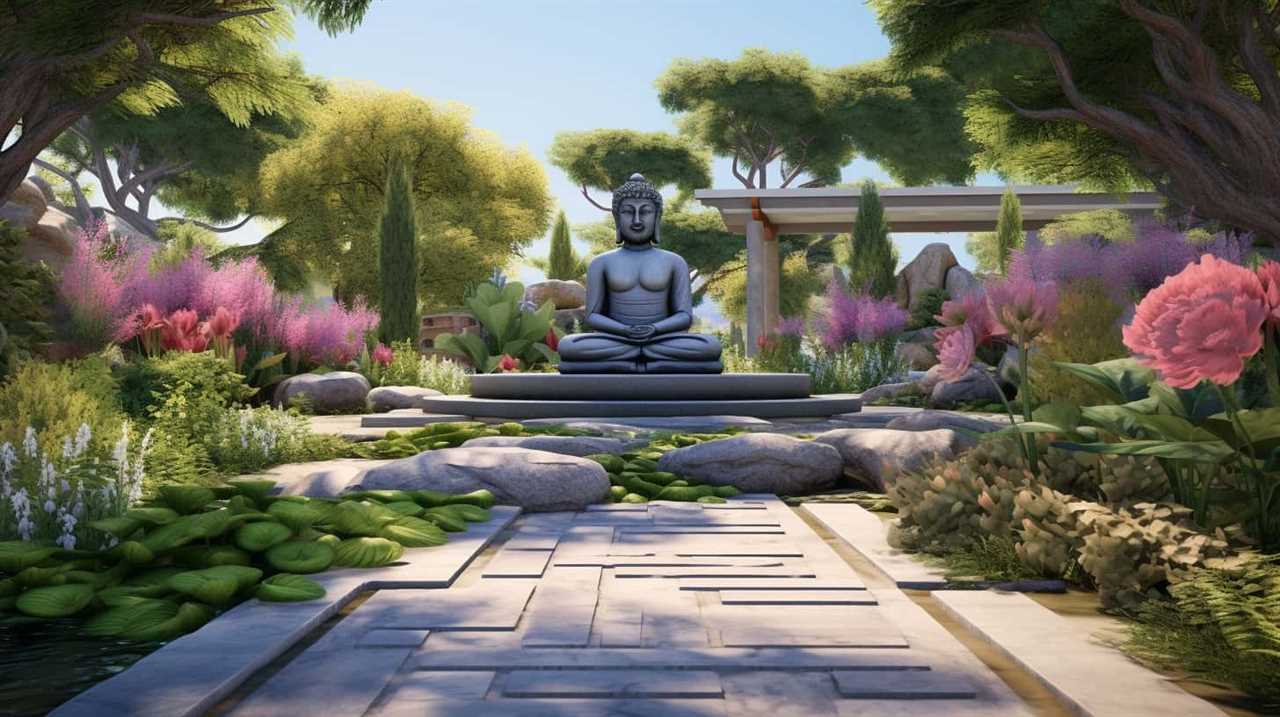
In the subsequent section, we’ll explore how Socrates viewed the examined life as the key to living an inspired and fulfilling existence.
Embracing the Examined Life
To truly live an inspired life, it’s essential that we actively embrace the examined life. Embracing the examined life requires a commitment to self-awareness and self-discovery. By engaging in introspection and questioning our beliefs and assumptions, we open ourselves up to a deeper understanding of ourselves and the world around us.
Here are four key reasons why embracing the examined life is crucial:
- Self-awareness: By examining our thoughts, emotions, and actions, we gain a greater understanding of who we’re as individuals. This self-awareness allows us to make conscious choices and align our actions with our values.
- Personal growth: The examined life fosters personal growth and development. Through self-reflection, we identify areas for improvement and can actively work towards becoming the best version of ourselves.
- Critical thinking: Embracing the examined life encourages critical thinking. By questioning our own beliefs and assumptions, we become more open-minded and better equipped to navigate complex issues.
- Authenticity: By embracing the examined life, we strive to live authentically. We align our actions with our true selves, rather than conforming to societal expectations or external pressures.
Seeking Knowledge Through Dialogue
When it comes to seeking knowledge, Socrates believed that dialogue was an essential tool. Through engaging in conversations with others, we’ve the opportunity to learn and expand our understanding of the world.
The Socratic method, which involves asking probing questions, was seen as an effective way to elicit deeper insights and challenge our assumptions. By constantly questioning and engaging in thoughtful discussions, we can actively participate in the pursuit of knowledge and enhance our intellectual growth.
Dialogue as Learning Tool
Engaging in dialogue is an effective way for us to acquire knowledge and learn from one another. Through thoughtful conversations, we can develop critical thinking skills and apply Socratic principles to deepen our understanding.
Here are four reasons why dialogue serves as a valuable learning tool:
- Encourages active engagement: Dialogue requires active participation, encouraging us to think critically and express our ideas effectively.
- Promotes diverse perspectives: By engaging in dialogue, we expose ourselves to different viewpoints and expand our understanding of complex topics.
- Fosters intellectual growth: Through dialogue, we can challenge our own beliefs and expand our knowledge by considering alternative perspectives.
- Enhances communication skills: Engaging in meaningful conversations hones our ability to articulate our thoughts, listen actively, and engage in respectful debate.
Socratic Method’s Effectiveness
Through dialogue, we can harness the power of the Socratic method to actively seek knowledge and deepen our understanding.
The effectiveness of Socratic questioning lies in its ability to encourage critical thinking, promote self-reflection, and challenge assumptions.
By engaging in a thoughtful and intellectual dialogue, we’re forced to examine our beliefs, consider alternative perspectives, and arrive at a more comprehensive understanding of the subject at hand.
This method has proven particularly valuable in education, as it encourages students to actively participate in their own learning process and develop their analytical skills.
The Socratic method fosters a sense of curiosity and a desire for mastery, empowering individuals to ask probing questions, engage in meaningful discussions, and ultimately arrive at their own conclusions.
It cultivates intellectual growth and prepares students for a lifetime of learning and exploration.
Role of Questioning
Questioning plays a vital role in our pursuit of knowledge and understanding through meaningful dialogue. It’s through questioning that we’re able to challenge assumptions and engage in critical thinking. Here are some key aspects of the role of questioning:
- Uncovering assumptions: By questioning assumptions, we can uncover hidden biases and beliefs that may hinder our understanding of a subject.
- Promoting critical thinking: Questioning prompts us to think deeply about the information presented to us, allowing us to analyze and evaluate it critically.
- Fostering intellectual growth: Engaging in questioning cultivates an intellectual curiosity that drives us to seek knowledge and expand our understanding.
- Facilitating meaningful dialogue: Questioning enables us to engage in thoughtful discussions, fostering an environment where ideas can be explored, challenged, and refined.
Confronting Ignorance and Overcoming Bias
As we tackle ignorance and strive to overcome bias, we must confront our own limitations and biases head-on. Socrates understood the importance of questioning our own beliefs and assumptions in order to gain a deeper understanding of the world around us. He believed that true wisdom comes from recognizing our own ignorance and actively seeking knowledge. In confronting biases, Socrates encouraged us to challenge our preconceived notions and examine the evidence before making judgments. By acknowledging our own limitations, we can become more open-minded and willing to consider different perspectives.
Overcoming ignorance requires a willingness to admit that we don’t know everything. Socrates emphasized the importance of humility and intellectual curiosity in the pursuit of knowledge. He believed that by constantly questioning and seeking understanding, we can expand our intellectual horizons and overcome the limitations of our own biases.
To confront ignorance and overcome bias, we must also be willing to engage in meaningful dialogue with others. Socrates believed in the power of conversation and debate to uncover the truth. By actively listening to others and considering their viewpoints, we can challenge our own biases and broaden our understanding of the world.
Cultivating Intellectual Humility
In our pursuit of overcoming ignorance and biases, we must cultivate intellectual humility to truly embrace Socrates’ teachings.
Intellectual humility is the recognition of our limitations and the willingness to acknowledge that we don’t have all the answers. It’s about being open-minded and receptive to new ideas, even if they challenge our existing beliefs.
Here are four key reasons why cultivating intellectual humility is crucial for our intellectual growth:
- It encourages a willingness to learn: Intellectual humility allows us to approach new information with an open mind, recognizing that there’s always more to learn. By embracing this mindset, we create opportunities for personal growth and development.
- It fosters intellectual curiosity: When we cultivate intellectual humility, we become more curious about the world around us. We actively seek out new knowledge and perspectives, which expands our understanding and enhances our critical thinking skills.
- It promotes intellectual honesty: Intellectual humility requires us to be honest with ourselves about our own limitations and biases. It encourages us to question our assumptions and to be open to feedback and constructive criticism.
- It enhances collaboration and dialogue: Intellectual humility creates a space for respectful and meaningful conversations. By being open-minded and willing to consider different viewpoints, we can engage in productive discussions that lead to deeper understanding and shared knowledge.
The Role of Ethics in Living a Meaningful Life
Ethics plays a vital role in shaping our lives and creating meaning for us. It provides a framework for understanding what’s morally right and wrong, and guides our behavior and decision-making. When it comes to living a meaningful life, ethics helps us navigate the complex landscape of moral choices and dilemmas that we encounter. One important aspect of ethics in this context is the role of empathy in moral decision-making.
Empathy, the ability to understand and share the feelings of others, allows us to connect with the experiences and perspectives of those around us. It helps us recognize the impact of our actions on others and enables us to make more informed moral decisions. By considering the consequences of our choices on others, we can strive to act in ways that promote well-being and avoid causing harm.
Moral decision-making involves evaluating the ethical dimensions of a situation, considering the rights and welfare of all parties involved, and making choices that align with our values and principles. Ethics provides a set of principles and guidelines that help us navigate these complex decisions, ensuring that our actions are grounded in moral integrity and ethical responsibility.
Finding Inner Fulfillment Through Virtuous Actions
When it comes to finding inner fulfillment, Socrates believed that virtuous actions were essential. He argued that living a virtuous life wasn’t just about following a set of rules or moral guidelines, but rather, it was about cultivating virtues such as wisdom, courage, and justice.
According to Socrates, these virtues weren’t only the key to living a meaningful life, but they also brought about a sense of inner fulfillment and inspiration. By engaging in virtuous actions, individuals could align themselves with their true selves and experience a deep sense of satisfaction and purpose.
Socrates and Virtuous Actions
We can achieve inner fulfillment by engaging in virtuous actions, according to Socrates. In order to understand how virtuous actions can lead to fulfillment, we must first engage in self-reflection. Socrates believed that self-reflection allows us to examine our own moral character and identify areas where we can improve.
By analyzing our actions and motivations, we can cultivate virtues such as kindness, honesty, and courage. These virtues, in turn, contribute to our overall sense of fulfillment and well-being. Socrates also emphasized the importance of moral character in guiding our actions. By consistently choosing virtuous actions, we not only improve ourselves but also contribute positively to society.
Socrates believed that true fulfillment comes from living a life of moral excellence, and virtuous actions are the pathway to achieving this goal.
Inner Fulfillment and Virtues
To achieve inner fulfillment, we must embrace virtues through our actions. Inner reflection and moral character play a crucial role in this pursuit. Socrates believed that living a virtuous life leads to true fulfillment and happiness. However, it is not enough to simply possess virtuous qualities; we must actively practice them in our daily lives.
| Virtue | Description | Action |
|---|---|---|
| Courage | The ability to face adversity with strength and determination | Standing up for what is right, even in the face of opposition |
| Justice | The fair and equitable treatment of others | Treating others with respect and fairness, regardless of their background |
| Wisdom | The ability to make sound judgments and decisions | Seeking knowledge and applying it in practical ways |
Living an Inspired Life
Through embracing virtues and actively practicing them in our daily lives, we can find inner fulfillment and live an inspired life. Virtues serve as guiding principles that shape our thoughts, actions, and behaviors.
By cultivating self-motivation, we can tap into our innate drive to pursue our passions and goals. This self-motivation fuels our desire to seek personal growth and push beyond our comfort zones.
Additionally, embracing creative expression allows us to explore our unique talents and share them with the world. This form of self-expression not only brings us joy and fulfillment but also inspires others.
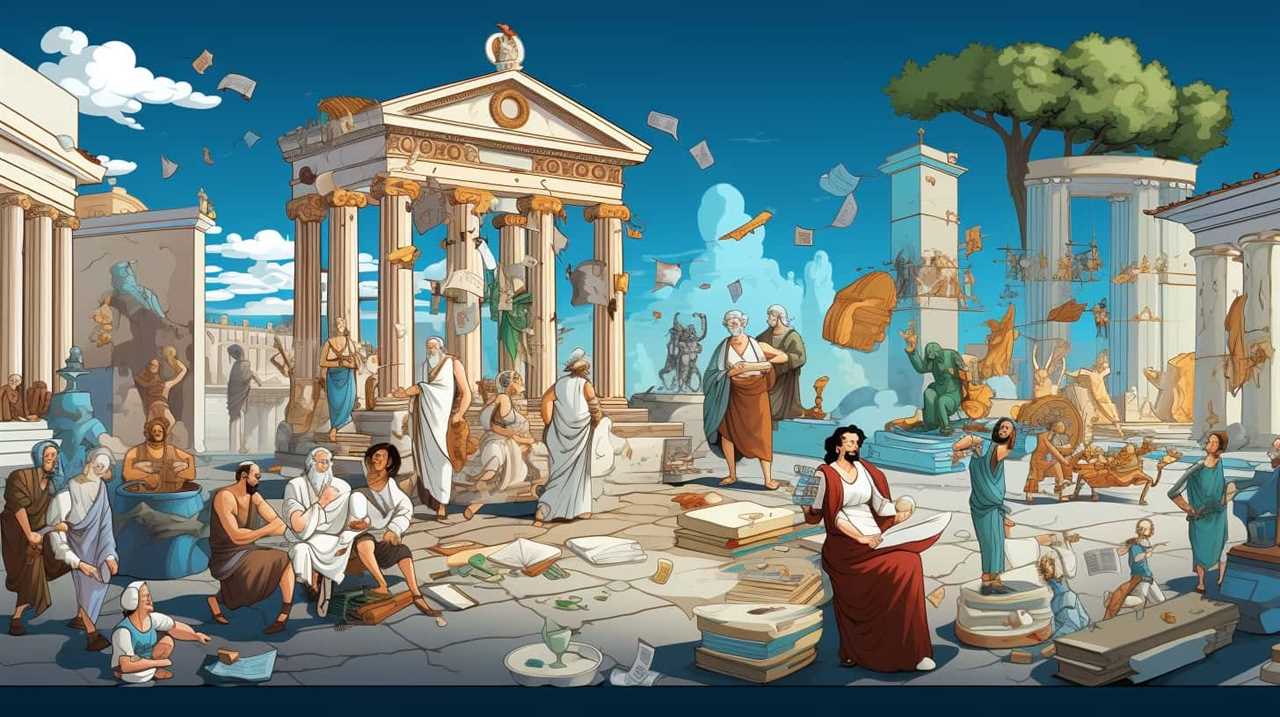
Living an inspired life means harnessing the power of virtues, self-motivation, and creative expression to constantly evolve and contribute to the world around us.
Developing Critical Thinking Skills
Socrates’ teachings emphasize the importance of cultivating our critical thinking skills. He believed that logical reasoning and analytical thinking were essential tools for living an inspired life. Socrates understood that our thoughts and beliefs shape our actions and ultimately determine the quality of our lives. By developing our critical thinking skills, we can navigate through the complexities of life with clarity and precision.
Critical thinking involves actively questioning, examining, and evaluating ideas and arguments. It requires us to think independently, challenge assumptions, and seek evidence and logical reasoning to support our beliefs. Socrates believed that through critical thinking, we can uncover the truth, make informed decisions, and lead a more fulfilling life.
By honing our critical thinking skills, we become better equipped to solve problems, make sound judgments, and think creatively. We develop the ability to analyze complex situations, consider multiple perspectives, and make informed decisions based on evidence and reason. This enables us to navigate through the challenges and uncertainties of life with confidence and clarity.
In the subsequent section, we’ll explore how we can apply Socratic principles to everyday life and integrate critical thinking into our daily routines. By utilizing these principles, we can enhance our decision-making abilities, improve our problem-solving skills, and cultivate a deeper understanding of ourselves and the world around us.
Transitioning into the next section, let’s now explore how we can apply Socratic principles to our everyday lives.
Applying Socratic Principles to Everyday Life
Let’s explore how we can incorporate Socratic principles into our daily lives to live more inspired and fulfilling lives. The Socratic approach, known for its emphasis on critical thinking and self-examination, offers valuable insights that can be applied to various aspects of our everyday existence.
Here are some ways in which we can integrate Socratic principles into our lives:
- Questioning assumptions: By constantly questioning our own beliefs and assumptions, we can gain a deeper understanding of ourselves and the world around us. This allows us to challenge our preconceived notions and open ourselves up to new perspectives.
- Active listening: Socrates believed in the power of dialogue and active listening. By engaging in meaningful conversations with others, we can cultivate empathy, broaden our horizons, and learn from different viewpoints.
- Self-reflection: Taking the time to reflect on our thoughts, actions, and experiences allows us to gain self-awareness and make more informed decisions. Socratic self-reflection encourages us to examine our own biases, values, and motivations.
- Cultivating curiosity: Socrates believed that true wisdom comes from acknowledging our own ignorance and seeking knowledge. By cultivating curiosity and a thirst for learning, we can continuously expand our understanding of the world and ourselves.
Incorporating Socratic principles into our everyday lives brings numerous benefits. It encourages critical thinking, fosters intellectual growth, promotes self-discovery, and enhances our ability to engage in meaningful conversations. By embracing the Socratic approach, we can lead more inspired and fulfilling lives.
Frequently Asked Questions
How Does Self-Reflection Contribute to Living an Inspired Life?
Self-reflection benefits our inner growth and contributes to living an inspired life. By examining our thoughts, actions, and values, we gain self-awareness and clarity, enabling us to align with our passions and purpose.
What Are Some Practical Steps for Pursuing Wisdom and Virtue in Daily Life?
In pursuing wisdom and virtue, we can take practical steps towards living an inspired life. By engaging in self-reflection, seeking knowledge, practicing virtues, and examining our actions, we can cultivate a meaningful and fulfilling existence.
Can Questioning Assumptions and Beliefs Help in Finding Purpose and Meaning?
Questioning assumptions and beliefs is a powerful tool for finding purpose and meaning. It allows us to break free from societal norms and discover our true passions. Socrates believed that the unexamined life is not worth living.
How Can One Embrace the Examined Life in a Society That Values Conformity?
Embracing individuality and navigating societal pressures can be challenging, but it is essential for living an examined life. We must resist conformity, question assumptions, and seek our own truths to find purpose and meaning.
What Are Some Techniques to Overcome Bias and Confront Ignorance in Our Thinking?
To overcome bias and confront ignorance in our thinking, we must employ techniques that challenge our preconceived notions and actively seek out diverse perspectives. Confrontation becomes an opportunity for growth and learning.
How Can Socrates’ Teachings on Living an Inspired Life Be Applied in Modern Times?
Socrates teachings and quotes on living an inspired life can still be applied in modern times. His emphasis on self-reflection, questioning assumptions, and striving for knowledge remains relevant. By following his guidance to “know thyself” and seek truth, individuals can navigate the complexities of modern life with purpose and wisdom.
Conclusion
In conclusion, Socrates’ teachings on living an inspired life emphasize the importance of:
- Self-reflection
- Pursuing wisdom and virtue
- Questioning assumptions and beliefs
- Embracing the examined life
By seeking knowledge through dialogue, practicing ethics, and finding inner fulfillment through virtuous actions, we can:
- Develop critical thinking skills
- Apply Socratic principles to everyday life
Socrates’ profound insights continue to resonate, urging us to lead a meaningful and examined life filled with:
- Intellectual growth
- Moral integrity.
Fritz is a writer whose humor and wit infuse life into words. His creativity, combined with a profound love for the English language, makes him a unique voice at afterQuotes. Fritz’s engagement with books, culture, and social media adds depth to his contributions, making them resonate with our diverse audience.
Ancient Quotations
9 Best Mesopotamian Cuneiform Inscription Quotes Revealed

We have uncovered the top 9 quotes from Mesopotamian cuneiform inscriptions for those seeking timeless nuggets of wisdom.
While some may argue that these ancient texts are irrelevant in today’s modern world, we believe that the insights they offer are timeless and invaluable.
Through our diligent decoding of these enigmatic messages from the past, we have discovered a wealth of knowledge and wisdom that has been preserved in stone for centuries.
These powerful words, crafted by the skilled scribes of Mesopotamia, provide a glimpse into the rich literary treasures of this ancient civilization.
Join us as we delve into the secrets of Mesopotamian inscriptions and uncover the profound insights they hold.
Key Takeaways
- The oldest known writing system, cuneiform script, was developed by the Sumerians around 3200 BCE in Mesopotamia.
- Deciphering Mesopotamian inscriptions requires expertise in linguistics, archaeology, and history.
- Mesopotamian inscriptions reveal the cryptic secrets of Mesopotamian culture and history.
- Decoding symbols in Mesopotamian cuneiform is a complex task that requires linguistic analysis and comparison to known texts.
The Oldest Known Writing System
The discovery of the oldest known writing system in Mesopotamia has revolutionized our understanding of ancient civilizations. This breakthrough has shed light on the earliest forms of written communication and has provided valuable insights into the lives and cultures of ancient peoples.
The oldest writing techniques in Mesopotamia date back to around 3200 BCE, with the emergence of cuneiform script. Cuneiform was developed by the Sumerians and was used to record various aspects of their society, including administrative, economic, and religious matters. It consisted of wedge-shaped marks made on clay tablets using a stylus.
Deciphering ancient scripts has been a challenging task for scholars. However, the discovery of the oldest known writing system has provided a crucial starting point for unlocking the mysteries of ancient languages. By studying these ancient texts, linguists have been able to decipher the meanings of the symbols and gain valuable insights into the beliefs, customs, and activities of ancient civilizations.
The oldest known writing system hasn’t only expanded our knowledge of ancient cultures but has also highlighted the sophistication and complexity of these early civilizations. It’s a testament to the ingenuity and creativity of our ancestors, as they developed a method to record and preserve their thoughts and experiences for future generations.
The Secrets of Mesopotamian Inscriptions
When exploring the secrets of Mesopotamian inscriptions, we’re confronted with the oldest written language known to humanity. These inscriptions hold immense historical significance, providing valuable insights into the ancient civilizations that once thrived in Mesopotamia.
Deciphering the ancient script is a complex task, requiring expertise in linguistics, archaeology, and history, but it’s through this process that we can unlock the stories and knowledge preserved in these inscriptions.
Oldest Written Language
We delved into the secrets of Mesopotamian inscriptions, uncovering the fascinating origins of the oldest written language.
Mesopotamia, known as the cradle of civilization, was the birthplace of cuneiform script, which emerged around 3200 BCE. This ancient system of writing played a crucial role in the linguistic evolution of human communication.
The Sumerians, an ancient Mesopotamian civilization, were the first to develop this complex writing system, using wedge-shaped marks on clay tablets. Over time, cuneiform script spread throughout Mesopotamia, adapting to different languages such as Akkadian, Babylonian, and Assyrian.
This linguistic evolution allowed for the transmission of knowledge, literature, and legal records across generations. The decipherment of Mesopotamian inscriptions has provided valuable insights into the earliest forms of written communication, enriching our understanding of human history and culture.
Historical Significance and Context
Throughout our research, we frequently encountered the historical significance and context behind Mesopotamian inscriptions, providing us with valuable insights into their secrets. The historical preservation of these inscriptions has allowed us to unravel the rich tapestry of ancient Mesopotamian culture.
Here are four key points that highlight their cultural impact:
- Mesopotamian inscriptions serve as a written record of the civilization’s achievements, including their advancements in agriculture, architecture, and governance.
- These inscriptions provide evidence of the Mesopotamians’ complex religious beliefs and rituals, shedding light on their spiritual practices and worldview.
- The inscriptions also reveal the Mesopotamians’ fascination with astronomy and mathematics, showcasing their intellectual prowess.
- Additionally, these inscriptions offer glimpses into the daily lives and social structures of the Mesopotamian people, giving us a deeper understanding of their customs and traditions.
By delving into the historical significance and context of Mesopotamian inscriptions, we gain a profound appreciation for the impact of this ancient civilization.
Transitioning to the subsequent section, let’s now explore the intriguing process of deciphering ancient script.
Deciphering Ancient Script
During our research, we encountered the challenges and triumphs of deciphering the ancient script of Mesopotamian inscriptions, unveiling the secrets they hold.
Decoding symbols in Mesopotamian cuneiform is a complex task that requires meticulous linguistic analysis. The script consists of a combination of wedges and lines, representing syllables, words, and phrases. Each symbol has multiple meanings, making it essential to consider the context in which it’s used.
Linguistic analysis plays a crucial role in deciphering these inscriptions, as it helps identify patterns and grammatical structures. By studying the language and comparing it to known texts, scholars can gradually decipher the symbols and unlock the meaning behind them.
The process of decipherment is time-consuming and requires expertise in ancient languages, but it’s essential for understanding the rich history and culture of Mesopotamia.
Unearthing Mesopotamia’s Ancient Quotes
The exploration of Mesopotamia’s ancient ruins has revealed a treasure trove of profound and thought-provoking quotes carved into cuneiform inscriptions. Uncovering lost wisdom and deciphering ancient symbols has allowed us to gain insight into the beliefs and values of the people who lived in this ancient civilization. These ancient quotes provide us with a window into their worldview and offer valuable lessons that still resonate with us today.
- ‘In the shadows of darkness, find the light within.’
- ‘The greatest strength lies in unity, for a single reed alone can’t make music.’
- ‘Do not let the sands of time erase the memory of your existence.’
- ‘Wisdom is the foundation upon which all knowledge is built.’
These quotes evoke a sense of introspection and contemplation, urging us to reflect on the human experience and consider our place in the world. They remind us of the timeless nature of wisdom and the enduring power of ancient civilizations. By studying these cuneiform inscriptions, we can uncover the wisdom of the past and gain a deeper understanding of our own existence.
Decoding the Cuneiform Inscriptions
Decoding the cuneiform inscriptions is a fascinating endeavor that allows us to understand the ancient writing techniques of Mesopotamia and uncover the historical significance hidden within these texts.
By analyzing the intricate symbols and deciphering the complex language, we gain valuable insights into the beliefs, customs, and daily life of the people who lived thousands of years ago.
The process of decoding cuneiform inscriptions requires meticulous attention to detail and a deep understanding of the cultural context, making it a vital tool in unraveling the mysteries of the ancient world.

Ancient Writing Techniques
We actively engage in deciphering ancient Mesopotamian cuneiform inscriptions through the meticulous study of writing techniques. By examining the methods used by ancient scribes, we gain a deeper understanding of how they encoded their messages onto clay tablets.
Here are some key ancient writing techniques that aid in the decoding process:
- Stylistic Variations: Different scribes had their own unique styles, which can help identify the author of a particular inscription.
- Phonetic Complementation: Cuneiform writing utilized a combination of logograms (representing whole words) and phonetic signs (representing individual sounds) to convey meaning.
- Numerical Systems: The ancient Mesopotamians had complex numerical systems that were incorporated into their writing, requiring a thorough understanding of mathematical concepts.
- Preservation Methods: Ancient scribes used various techniques, such as baking and sealing tablets, to ensure the longevity of their inscriptions.
Historical Significance of Cuneiform
Our exploration of the historical significance of cuneiform brings to light the invaluable insights gained from deciphering these ancient inscriptions.
Cuneiform, the earliest known form of writing, has had a profound cultural impact on the civilizations of Mesopotamia.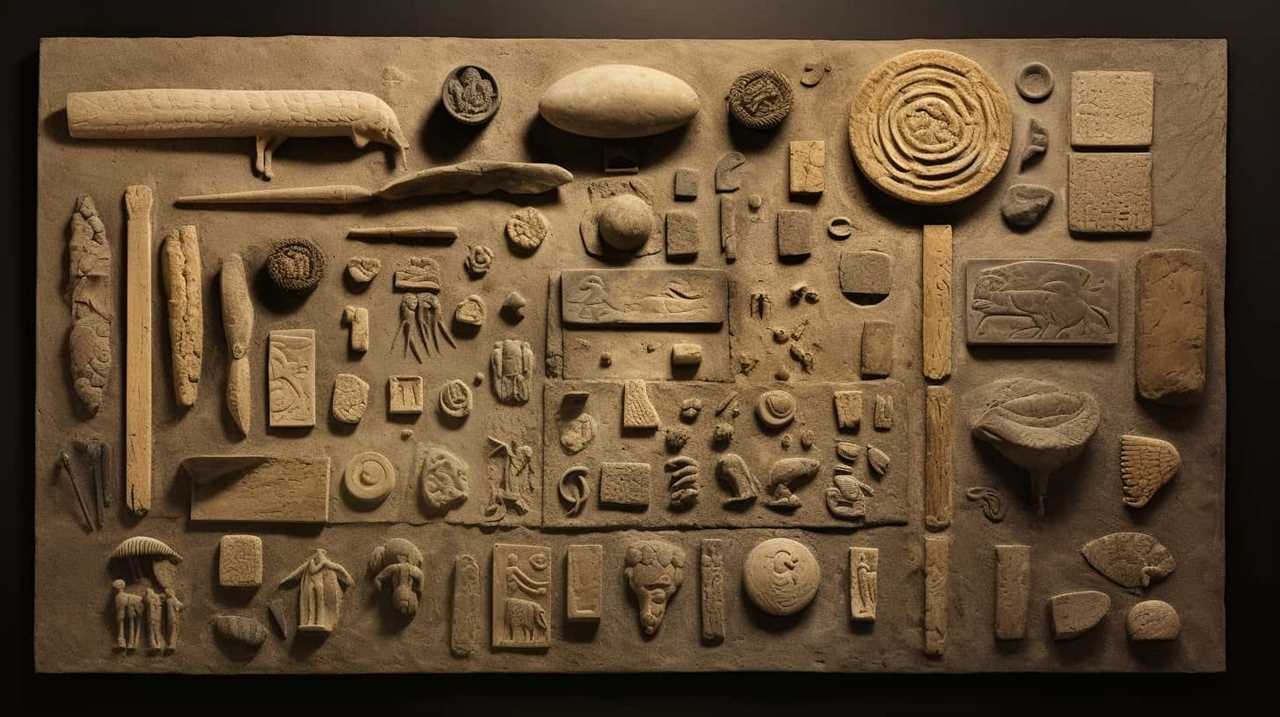
Through the decoding of cuneiform inscriptions, we’ve been able to uncover a wealth of knowledge about ancient Mesopotamian society, including their political systems, religious beliefs, and economic practices.
These inscriptions provide us with firsthand accounts of historical events, such as wars and conquests, as well as personal stories and legal documents.
The preservation techniques used in cuneiform, such as clay tablets and baked bricks, have allowed these ancient texts to survive for thousands of years, providing us with a window into the past and enriching our understanding of human history.
Insights From Ancient Cuneiform Texts
Through the analysis of ancient cuneiform texts, we gain valuable insights into the civilization and culture of Mesopotamia. These texts, written using ancient writing techniques, provide us with a window into the lives of the people who lived thousands of years ago. Deciphering ancient script has allowed us to uncover a wealth of information about their beliefs, social structures, and daily activities.

Here are some key insights we’ve gained from these texts:
- Religious practices: Cuneiform texts reveal the importance of religion in Mesopotamian society. They contain hymns, prayers, and rituals dedicated to various gods and goddesses, shedding light on their religious beliefs and practices.
- Legal systems: Cuneiform tablets also contain laws and legal codes that provide valuable information about the justice system in ancient Mesopotamia. They outline rules regarding property ownership, contracts, and penalties for crimes, giving us a glimpse into their legal framework.
- Economic activities: Cuneiform texts provide detailed records of economic activities such as trade, taxation, and agricultural practices. They offer insights into the organization of markets, the use of currency, and the management of resources in ancient Mesopotamia.
- Literary and artistic expressions: Cuneiform texts include epic poems, myths, and stories that showcase the literary and artistic talents of the Mesopotamian people. These texts allow us to appreciate their creativity and imagination, as well as the themes and motifs that were important to them.
Mesopotamian Wisdom Preserved in Stone
One can find a treasure trove of Mesopotamian wisdom preserved in stone through the study of cuneiform inscriptions. These ancient writings, etched onto tablets and monuments, provide valuable insights into the beliefs, values, and knowledge of the Mesopotamian civilization. The durability of stone has allowed these inscriptions to survive for thousands of years, offering us a glimpse into the past and shedding light on the intellectual and cultural achievements of this ancient society.
Mesopotamian wisdom, encompassing various aspects of life such as law, morality, and the nature of the divine, is beautifully encapsulated in these stone inscriptions. They reveal the Mesopotamians’ deep reverence for their gods and their belief in the interconnectedness of the natural and supernatural realms. These texts also provide practical advice on topics like farming, trade, and governance, showcasing the Mesopotamians’ practical knowledge and innovative thinking.
The preservation of Mesopotamian wisdom in stone is a testament to the importance placed on education and intellectual pursuits in this ancient civilization. The Mesopotamians recognized the value of recording their knowledge for future generations, ensuring that their wisdom would endure through the ages.
Transitioning into the subsequent section about ‘discovering Mesopotamia’s literary treasures,’ these stone inscriptions serve as a foundation for exploring the rich literary tradition of Mesopotamia. By studying these texts, we can unlock further insights into the intellectual, cultural, and literary achievements of this remarkable civilization.
Discovering Mesopotamia’s Literary Treasures
We are excited to explore Mesopotamia’s literary treasures, revealed through the study of cuneiform inscriptions. Mesopotamian literature holds immense historical and cultural significance, allowing us to gain profound insights into the lives and beliefs of ancient civilizations.
The importance of preserving these literary works can’t be overstated, as they provide a glimpse into the rich tapestry of Mesopotamian culture. They transport us back in time, enabling us to experience the thoughts, emotions, and experiences of people who lived thousands of years ago. They offer a unique perspective on the development of human civilization, shedding light on the intellectual and artistic achievements of the Mesopotamians.
They provide valuable information about the religious and mythological beliefs of these ancient societies, offering a window into their spiritual practices and worldview. They serve as a testament to the enduring power of storytelling, highlighting the universal human desire to communicate, entertain, and preserve knowledge.

The study of Mesopotamian literature not only enriches our understanding of the past but also helps us appreciate the timeless themes and ideas that continue to resonate with us today. By preserving and studying these literary treasures, we ensure that the voices of the ancient Mesopotamians aren’t forgotten, allowing their stories and wisdom to continue inspiring and enlightening future generations.
Enigmatic Messages From the Past
Continuing our exploration of Mesopotamia’s literary treasures, we delve into the enigmatic messages from the past revealed through the study of cuneiform inscriptions. These ancient writings, etched into clay tablets using a wedge-shaped stylus, offer a glimpse into the thoughts, beliefs, and daily life of the Mesopotamians. However, the symbols used in cuneiform script can be mysterious and challenging to decipher.
Deciphering techniques have been crucial in unraveling the secrets hidden within these inscriptions. Scholars have meticulously analyzed the patterns and variations in the symbols, comparing them with known texts and languages to identify commonalities and meanings. This process involves a deep understanding of the grammatical and linguistic structures of ancient Mesopotamian languages, such as Sumerian and Akkadian.
One such technique is the contextual approach, where researchers examine the surrounding text and the cultural context in which the inscription was created. By considering the purpose and audience of the writing, scholars can make educated guesses about the meaning of certain symbols or phrases.
Another technique involves comparing cuneiform inscriptions with other ancient texts, such as royal decrees, religious hymns, or legal documents. By identifying similarities in words and phrases, scholars can gradually build a lexicon of cuneiform symbols and their corresponding meanings.
Powerful Words of Mesopotamian Scribes
As we delve into the realm of Mesopotamian cuneiform inscriptions, we’re captivated by the power and eloquence exhibited in the words of these ancient scribes. The techniques employed by Mesopotamian scribes were truly remarkable, showcasing their mastery of the written word. Here are some examples of their literary wisdom that continue to resonate with us today:
- ‘The pen is mightier than the sword.’ This phrase, attributed to a Mesopotamian scribe, emphasizes the power of words to shape and influence society.
- ‘Knowledge is the key to unlocking the mysteries of the universe.’ Mesopotamian scribes recognized the importance of knowledge and the pursuit of wisdom in their writings.
- ‘Through writing, we immortalize our thoughts and experiences.’ Scribes understood the significance of preserving their ideas and experiences for future generations.
- ‘Words have the power to heal or harm.’ This statement highlights the responsibility of scribes in using their words wisely and ethically.
These insights into the world of Mesopotamian scribes provide a glimpse into the sophistication and intellectual depth of their society. Through their carefully crafted inscriptions, these ancient scribes left a lasting legacy of profound wisdom and literary excellence.
Frequently Asked Questions
How Were Cuneiform Inscriptions Used in Ancient Mesopotamia?
Cuneiform inscriptions were used for various purposes in ancient Mesopotamia. They served as a means of recording information, communicating ideas, and documenting legal, administrative, and religious matters. The significance of cuneiform writing cannot be overstated in understanding this ancient civilization.

What Tools Were Used to Create Cuneiform Inscriptions?
Tools and techniques used to create cuneiform inscriptions in ancient Mesopotamia included a stylus made of reed or bone, clay tablets, and a wedge-shaped writing system. These tools allowed for precise and durable writing.
How Were Cuneiform Inscriptions Deciphered and Translated?
Deciphering techniques for cuneiform inscriptions involved analyzing repeated signs, comparing them to known languages, and using bilingual texts. Translation methods included identifying word meanings, grammar rules, and context. It was a complex process requiring expertise and extensive knowledge.
Were Cuneiform Inscriptions Primarily Used for Practical or Decorative Purposes?
Cuneiform inscriptions were primarily used for practical purposes, such as record-keeping and communication. However, they also had cultural and historical significance, as they preserved important information about ancient Mesopotamian civilizations.
What Role Did Scribes Play in the Creation of Cuneiform Inscriptions?
Scribes played a crucial role in the creation of cuneiform inscriptions. Their expertise and knowledge were essential in preserving important information and recording historical events. The importance of cuneiform cannot be overstated as it provided a written record of Mesopotamian civilization.
Can you provide more Mesopotamian Cuneiform Inscription quotes similar to the ones you’ve already revealed?
Certainly! Here are some top Mesopotamian text quotes to further explore this ancient writing system: 1. “I am the queen, the gathering of the gods.” 2. “Oh, endless womb of the land, bearer of all things.” 3. “You are the storm, the roaring wind that brings life.
Conclusion
As we unravel the ancient cuneiform inscriptions of Mesopotamia, we’re transported to a world of wisdom and enigmatic messages. Through these powerful words, preserved in stone, we gain insights into the thoughts and beliefs of the past.
Each inscription is a literary treasure, holding secrets waiting to be decoded. Symbolizing the enduring power of knowledge, these inscriptions evoke a sense of awe and wonder, reminding us of the timeless connection between humanity and the written word.
Lauren’s talent in writing is matched by her passion for storytelling. Her love for books and deep understanding of culture and entertainment add a distinct flavor to her work. As our media and press contact, Lauren skillfully bridges the gap between afterQuotes and the broader media landscape, bringing our message to a wider audience.
Ancient Quotations
9 Powerful Stoicism Quotes to Conquer Challenges

Did you know that 90% of successful individuals adhere to the timeless principles of Stoicism? If you aim to conquer challenges and attain mastery in your life, then this is the perfect place for you to be.
In this article, we will explore 9 powerful Stoicism quotes that will equip you with the tools to overcome any obstacle that comes your way. Stoicism, with its focus on resilience, acceptance, wisdom, inner strength, discipline, embracing change, courage, finding peace, and cultivating virtuous qualities, provides a practical and actionable framework for personal growth and excellence.
By internalizing these Stoic principles, you can navigate life’s challenges with grace and emerge stronger, wiser, and more resilient than ever before. So, let’s dive into these empowering Stoicism quotes and unlock the secrets to conquering challenges.
Key Takeaways
- Stoicism encourages us to remain steadfast in the face of challenges and see obstacles as opportunities for growth.
- Stoicism emphasizes the importance of focusing on what we can control, such as our perception and response to challenges.
- Cultivating gratitude and practicing self-control are essential stoic virtues that foster resilience and inner calm.
- Stoicism teaches us to embrace change, recognize its inevitability, and adapt to it for personal growth and well-being.
Stoicism Quotes on Resilience
We frequently find solace and strength within stoicism’s teachings as they remind us of our own resilience in the face of adversity. Stoicism provides a practical philosophy that encourages us to remain steadfast and unwavering in the midst of life’s challenges. Stoic quotes on perseverance serve as powerful reminders of our ability to overcome obstacles and emerge stronger on the other side.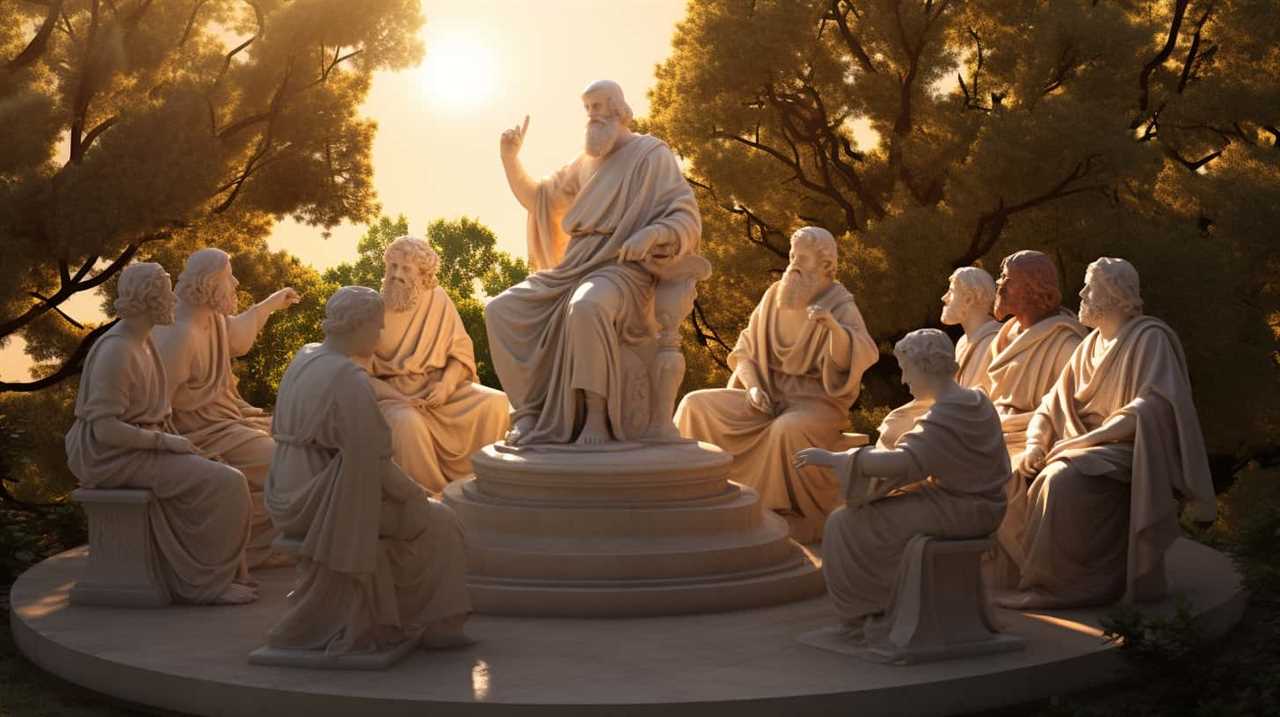
One such quote comes from Marcus Aurelius, who said, ‘The impediment to action advances action. What stands in the way becomes the way.’ This quote encapsulates the stoic belief that obstacles aren’t roadblocks, but rather opportunities for growth and progress. It reminds us that our response to adversity is within our control and that we’ve the power to transform obstacles into stepping stones towards success.
Another stoic quote on overcoming adversity comes from Epictetus, who stated, ‘It’s not what happens to you, but how you react to it that matters.’ This quote emphasizes the importance of maintaining a resilient mindset in the face of challenges. It reminds us that our perspective and attitude towards adversity can greatly influence our ability to overcome it.
As we delve into the topic of stoic quotes on acceptance, it’s important to recognize that resilience and acceptance often go hand in hand. Stoicism teaches us to accept the things we can’t change and to focus our energy on what we can control. Through this acceptance, we find the strength to persevere and overcome the adversities that life throws our way.
Stoic Quotes on Acceptance
As we explore stoic quotes on acceptance, it’s essential to understand the profound wisdom that Stoicism offers in embracing and embracing the things we can’t change. Stoicism teaches us the importance of surrendering to the realities of life and letting go of our attachments to outcomes.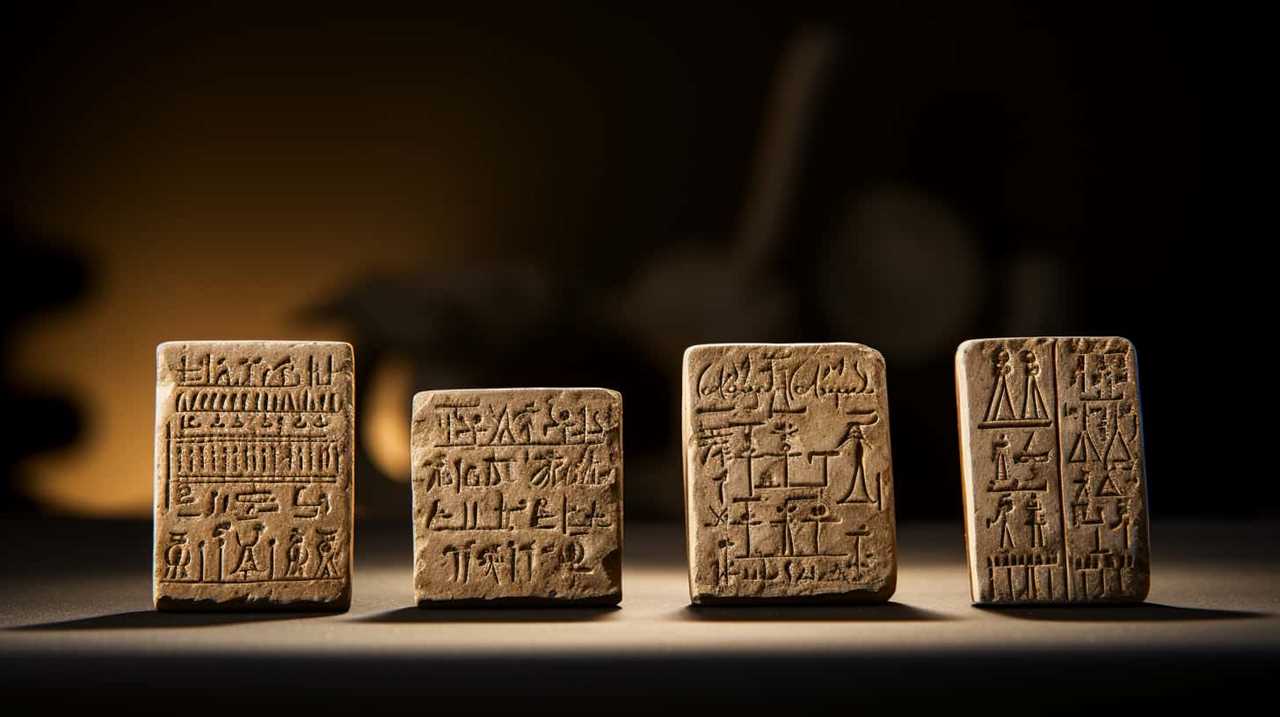
One powerful stoic quote on surrender comes from Epictetus, who said, ‘Do not seek to have events happen as you want them to, but instead want them to happen as they do happen, and your life will go well.’ This quote reminds us that we’ve no control over external events, and it’s futile to resist or try to change them. Instead, we should accept them as they’re and focus on our own inner state.
Another stoic quote on letting go comes from Marcus Aurelius, who said, ‘Accept the things to which fate binds you and love the people with whom fate brings you together, but do so with all your heart.’ This quote emphasizes the importance of accepting our circumstances and the people in our lives. It encourages us to embrace them fully, without resistance or judgment.
By accepting what we can’t change and letting go of our attachments, we free ourselves from unnecessary suffering and find peace within.
Quotes on Stoic Wisdom
When it comes to facing challenges, Stoic wisdom offers valuable insights that can help us develop resilience and navigate through difficult times.
Stoicism emphasizes the importance of internal strength and the ability to control our own thoughts and reactions.
Stoic Quotes for Resilience
Conquering challenges requires embodying stoic wisdom, which can be achieved by embracing resilience through powerful stoic quotes.
Stoicism quotes on inner strength serve as a guiding light, reminding us to stay strong and resilient in the face of adversity. One such quote by Marcus Aurelius states, ‘You have power over your mind – not outside events. Realize this, and you’ll find strength.’ This quote emphasizes the importance of focusing on what we can control, our own thoughts and actions, rather than being consumed by external circumstances.
Another stoic quote by Epictetus encourages us to develop resilience by accepting and adapting to the challenges we face: ‘It’s not what happens to you, but how you react to it that matters.’ This quote reminds us that our perception and response to challenges are within our control.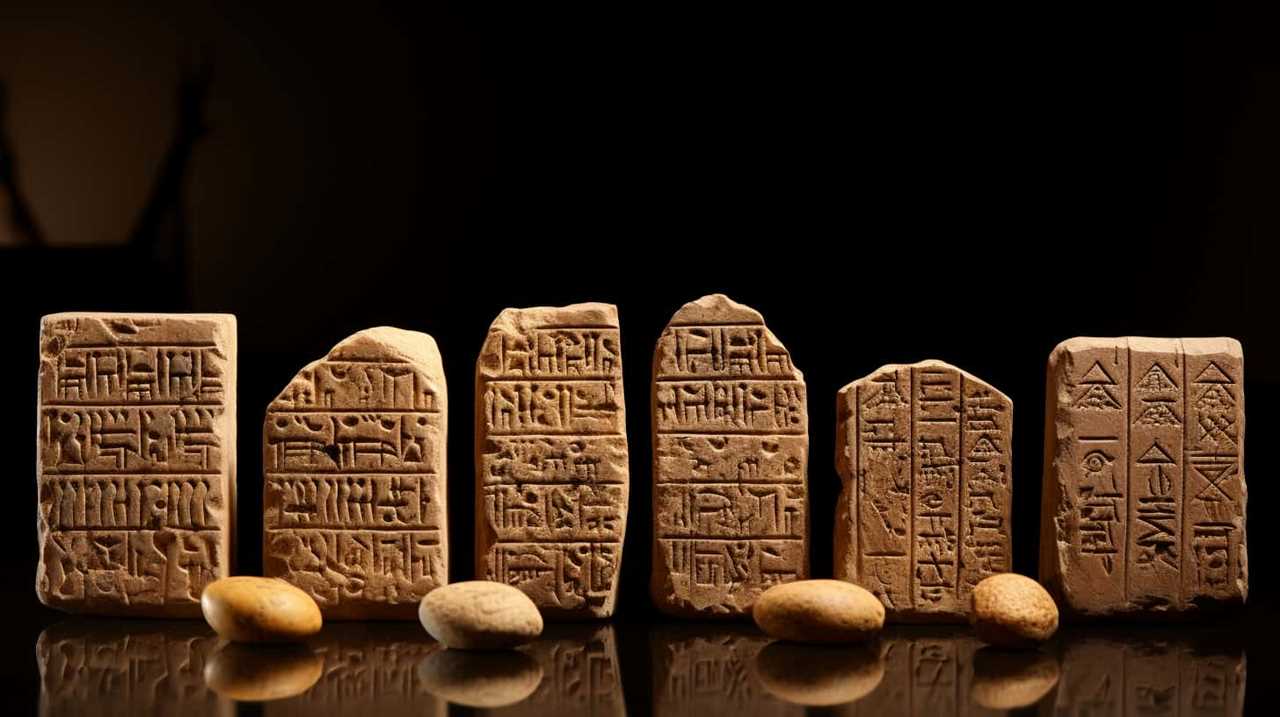
Applying Stoic Wisdom
To apply stoic wisdom in our lives, we can draw inspiration from powerful stoicism quotes that offer valuable insights and guidance. Stoic teachings, when applied in daily life, can help us navigate challenges with resilience and inner strength. By embracing stoic principles, we can cultivate a mindset that allows us to focus on what is within our control, rather than getting caught up in external circumstances. This shift in perspective empowers us to approach life’s difficulties with equanimity and acceptance. Stoicism teaches us to detach ourselves from outcomes and to instead focus on our own actions and attitudes. Through practicing gratitude, mindfulness, and self-reflection, we can develop a stoic mindset that enables us to face challenges head-on and find peace amidst chaos.
| Stoic Wisdom Quotes | Explanation |
|---|---|
| "The only thing you control is your own mind." | This quote reminds us that we have the power to control our thoughts and reactions, regardless of external circumstances. |
| "What upsets people is not things themselves, but their judgments about these things." | By recognizing that our judgments and interpretations shape our emotional responses, we can choose to adopt more rational and balanced perspectives. |
| "The obstacle is the way." | This quote emphasizes the stoic belief that obstacles and challenges are not to be avoided, but rather embraced as opportunities for growth and self-improvement. |
| "Amor fati." | This Latin phrase, meaning "love of fate," encourages us to embrace all aspects of our lives, both positive and negative, as essential parts of our journey. |
Stoicism Quotes on Inner Strength
As we explore Stoicism Quotes on Inner Strength, it becomes clear that the philosophy emphasizes the cultivation of resilience and resilience in the face of adversity. Stoic teachings provide valuable insights into developing our inner strength and overcoming challenges.
Here are three powerful stoicism quotes on self-control and overcoming adversity:
- ‘You have power over your mind – not outside events. Realize this, and you’ll find strength.’ – Marcus Aurelius
This quote reminds us that our strength lies within our ability to control our thoughts and reactions, rather than trying to control external circumstances. By focusing on our own attitudes and actions, we can cultivate inner resilience and face any adversity with grace.
- ‘The greater the difficulty, the more glory in surmounting it.’ – Epictetus
Epictetus teaches us that challenges are opportunities for growth and self-improvement. Instead of avoiding difficulties, we should embrace them as chances to showcase our inner strength and achieve greatness.
- ‘The obstacle is the way.’ – Ryan Holiday
This quote highlights the Stoic belief that obstacles aren’t setbacks but rather the path to success. By reframing obstacles as opportunities, we can tap into our inner strength and find creative solutions to overcome any adversity we encounter.
Stoic philosophy encourages us to develop our inner strength by practicing self-control and embracing challenges. By cultivating resilience and facing adversity head-on, we can conquer any obstacles that come our way and achieve true mastery in life.
Quotes on Stoic Discipline
With a focus on cultivating inner strength and resilience, stoic philosophy emphasizes the importance of discipline in navigating life’s challenges. Stoic discipline techniques provide a framework for developing self-control, mental fortitude, and emotional stability. These techniques, when applied in daily life, enable individuals to overcome obstacles and lead a virtuous and fulfilling existence.
To delve deeper into the concept of stoic discipline, let’s examine a table that highlights some key quotes from stoic philosophers on this topic:
| Stoic Discipline Quotes | Philosopher | Meaning |
|---|---|---|
| "The chief task in life" | Epictetus | The primary goal in life is to discipline our desires. |
| "Discipline your mind" | Marcus Aurelius | Train your mind to focus on what you can control. |
| "Self-control is strength" | Seneca | True strength lies in mastering oneself. |
| "Learn to be indifferent" | Epictetus | Embrace indifference towards external events. |
| "Endure and renounce" | Marcus Aurelius | Bear hardships and let go of attachments. |
These quotes underscore the importance of discipline in stoic philosophy. By practicing self-control, focusing on what is within our control, embracing indifference towards external outcomes, and letting go of attachments, we can navigate life’s challenges with resilience and inner strength.
Incorporating stoic discipline in daily life requires consistent effort and conscious decision-making. It involves recognizing our own desires, emotions, and reactions, and actively working towards aligning them with reason and virtue. By adopting stoic discipline techniques, we can cultivate a sense of inner harmony, withstand adversity, and live a life guided by wisdom and tranquility.
Stoic Quotes on Embracing Change
Embracing change can be challenging, but it’s important to recognize the hidden benefits that come with it.
Stoicism offers a valuable guide to adaptability, reminding us that change is inevitable and it’s how we respond to it that truly matters.
Embracing Change’s Hidden Benefits
Change brings about numerous hidden benefits that we, as individuals, often fail to recognize. Embracing change can be intimidating, as it requires us to step out of our comfort zones and face the unknown. However, when we overcome our fear of change, we unlock a world of possibilities and growth.
Here are three hidden benefits of embracing change:
- Personal growth: Change forces us to adapt and learn new skills, which leads to personal growth and development. It challenges us to step outside of our familiar routines and expand our horizons.
- Resilience: Embracing change teaches us resilience and the ability to bounce back from setbacks. It strengthens our mental and emotional muscles, preparing us to face future challenges with a positive mindset.
- Opportunities for success: Change often brings new opportunities that we may not have encountered otherwise. Embracing change opens doors to new experiences, relationships, and achievements that can lead to greater success in our personal and professional lives.
Stoicism’s Guide to Adaptability
When we embrace change, we gain valuable insights and practical wisdom from the teachings of Stoicism on adaptability, as exemplified by the following powerful stoic quotes.
The stoic mindset encourages us to recognize that change is inevitable and that our ability to adapt to it’s crucial for our growth and well-being. Stoicism teaches us that instead of resisting change or being overwhelmed by it, we should embrace it as an opportunity for growth and self-improvement.
By cultivating an adaptable mindset, we can navigate through life’s challenges with resilience and grace. Stoicism provides us with valuable tools and techniques for overcoming adversity and finding strength in the face of change. It reminds us that our true power lies in how we choose to respond to the ever-changing circumstances of life.
As we explore these stoic quotes on adaptability, we’ll gain a deeper understanding of how to embrace change and thrive in any situation.
Now, let’s transition into the next section where we’ll delve into stoic quotes on courage.
Quotes on Stoic Courage
As we delve into the realm of Stoic Courage, it becomes evident that embracing challenges with resilience and fortitude is essential for personal growth and triumph. Stoicism teaches us to face adversity head-on and to cultivate the inner strength needed to overcome any obstacle that comes our way.
Here are three powerful quotes on stoic courage that can inspire us to confront our challenges with unwavering determination:
- ‘The greater the difficulty, the more glory in surmounting it.’ – Epictetus This quote reminds us that the true measure of our courage lies in our ability to conquer difficult situations. By embracing challenges, we not only demonstrate our resilience but also create opportunities for personal growth and self-improvement.
- ‘Courage isn’t the absence of fear, but the triumph over it.’ – Seneca Seneca reminds us that courage isn’t the absence of fear, but rather the ability to face our fears and conquer them. It’s through confronting our fears that we develop the strength and courage necessary to overcome challenges.
- ‘Do not pray for an easy life; pray for the strength to endure a difficult one.’ – Bruce Lee This quote emphasizes the importance of developing inner strength and resilience. Instead of seeking an easy life, we should focus on building the fortitude to withstand difficult times. By doing so, we can face challenges head-on and emerge stronger on the other side.
As we explore stoic courage and its role in overcoming challenges, it becomes evident that finding peace within ourselves is an integral part of the journey.
Stoicism Quotes on Finding Peace
To attain inner tranquility, we must embrace stoicism’s wisdom on finding peace and incorporate its teachings into our lives. Stoicism offers invaluable insights into achieving tranquility and finding inner calm amidst the chaos of life. Let us explore some powerful stoicism quotes on finding peace:
| Quotes on Finding Peace |
|---|
| "The happiness of your life depends upon the quality of your thoughts." – Marcus Aurelius |
| "Peace is not the absence of conflict, but the ability to cope with it." – Epictetus |
| "The greatest obstacle to living is expectancy, which hangs upon tomorrow and loses today. You are arranging what lies in Fortune’s control, and abandoning what lies in yours." – Seneca |
| "If you are disturbed by external events, it is not the events themselves that trouble you, but only your own judgment about them. And it is in your power to wipe out that judgment now." – Marcus Aurelius |
These quotes remind us that finding peace requires a shift in mindset and the ability to control our thoughts and judgments. Stoicism teaches us that true tranquility comes from within, and that external events should not dictate our inner state. By practicing mindfulness and focusing on the present moment, we can cultivate a sense of calm and find peace even in the face of adversity. Stoicism’s wisdom on finding peace serves as a powerful guide for those seeking mastery over their own emotions and inner turmoil.
Quotes on Stoic Virtues
In our journey to conquer challenges, let’s delve into the wisdom of stoic virtues. Stoicism teaches us to cultivate certain qualities that can help us navigate life’s difficulties with resilience and inner strength. Here are some powerful stoic quotes on gratitude and self-control:
- ‘Gratitude isn’t only the greatest of virtues but the parent of all others.’ – Marcus Tullius Cicero
Gratitude is a foundational virtue that enables us to appreciate the present moment and find joy in the simple things. By cultivating gratitude, we can shift our focus from what we lack to what we already have, fostering contentment and resilience.
- ‘No man is free who isn’t master of himself.’ – Epictetus
Self-control is a crucial virtue that allows us to govern our desires, emotions, and actions. By practicing self-control, we can resist impulsive behavior, make rational decisions, and maintain inner calm in the face of challenges.
- ‘He is a wise man who doesn’t grieve for the things which he’s not, but rejoices for those which he has.’ – Epictetus
This quote reminds us of the importance of focusing on what we’ve rather than dwelling on what we lack. By cultivating a mindset of abundance and gratitude, we can find joy and contentment in our present circumstances, regardless of external circumstances.
Incorporating these stoic virtues of gratitude and self-control into our lives can help us navigate challenges with grace and mastery.
Frequently Asked Questions
What Are Some Practical Steps to Cultivate Resilience in Daily Life?
To cultivate resilience in daily life and overcome challenges, we must actively seek out opportunities for personal growth, maintain a positive mindset, and embrace adversity as a chance to learn and become stronger.
How Can Stoic Principles Help Individuals in Accepting Difficult Circumstances?
Stoic principles offer valuable insights for accepting difficult circumstances and overcoming adversity. By embracing the philosophy’s teachings, we can cultivate resilience, find inner strength, and maintain a sense of tranquility amidst life’s challenges.

Are There Any Specific Stoic Teachings That Focus on the Pursuit of Wisdom?
In the pursuit of wisdom, Stoic teachings provide invaluable guidance. By emphasizing self-reflection, rationality, and the cultivation of virtue, Stoicism equips individuals with the tools necessary to navigate life’s challenges and uncover profound truths.
How Can Stoic Philosophy Help Individuals in Developing Inner Strength?
Developing resilience and building mental fortitude are key aspects of stoic philosophy. By teaching us to accept what is beyond our control and focus on what we can change, stoicism empowers us to face challenges with inner strength.
What Are Some Effective Strategies to Practice Stoic Discipline in Modern Society?
In modern society, we can employ various strategies to practice stoic discipline and conquer challenges. By focusing on our inner thoughts, accepting what is beyond our control, and maintaining a sense of gratitude, we can cultivate resilience and inner strength.
How Are the Stoicism Quotes Related to the Strategies for Overcoming Challenges?
Stoicism quotes emphasize the importance of embracing challenges and finding inner strength to overcome them. The stoic strategies for challenges encourage resilience, self-discipline, and the ability to adapt to adversity. By focusing on what is within our control and accepting the things we cannot change, Stoicism offers valuable insights into facing life’s obstacles with courage and grace.
Conclusion
In conclusion, these powerful stoicism quotes provide valuable insights and guidance for conquering challenges in life. By embracing resilience, acceptance, wisdom, inner strength, discipline, embracing change, courage, finding peace, and cultivating virtues, we can navigate through difficult times with grace and determination.
Like a sturdy ship navigating stormy seas, stoicism teaches us to stay steady amidst the waves, always finding our way to calmer waters.
Lauren’s talent in writing is matched by her passion for storytelling. Her love for books and deep understanding of culture and entertainment add a distinct flavor to her work. As our media and press contact, Lauren skillfully bridges the gap between afterQuotes and the broader media landscape, bringing our message to a wider audience.
Ancient Quotations
9 Best Egyptian Hieroglyphic Sayings Deciphered
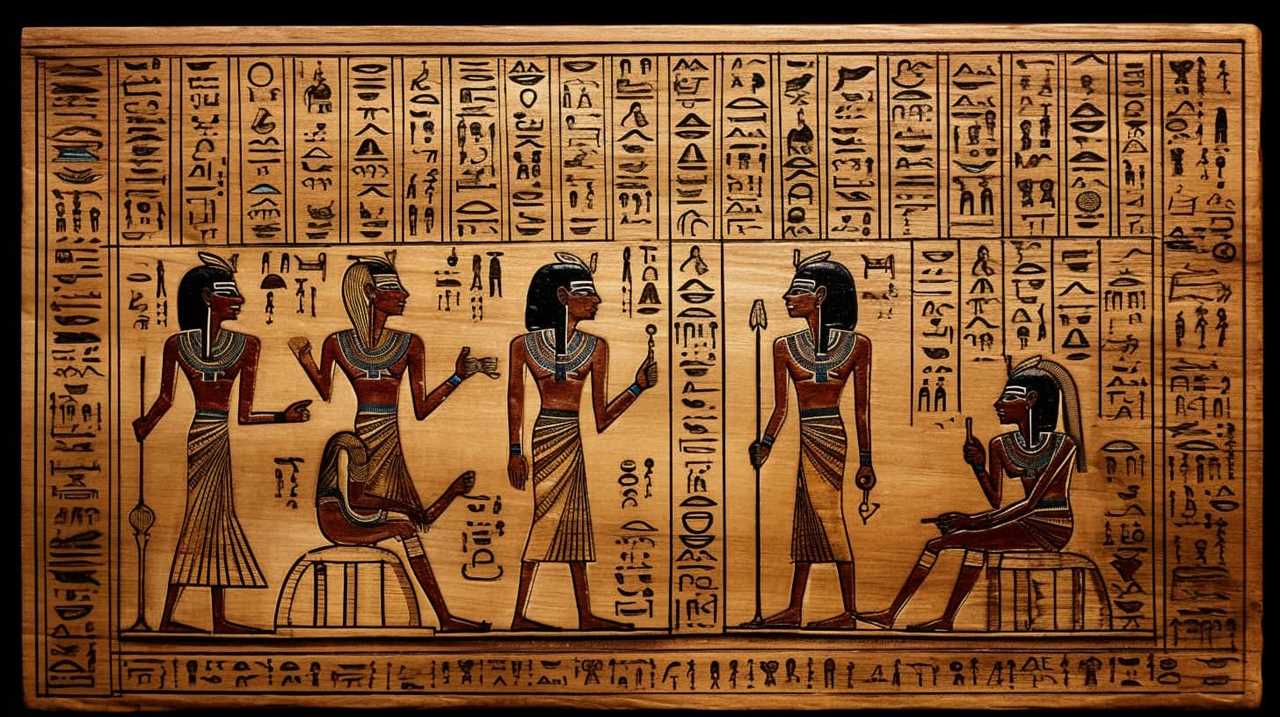
While delving into the secrets of ancient Egypt, we have unearthed valuable insights hidden within the intricate hieroglyphics. These enigmatic symbols, etched onto the walls of temples and tombs, play a crucial role in understanding the beliefs and culture of a civilization that thrived thousands of years ago.
Join us as we delve into the enchanting world of Egyptian hieroglyphic sayings, deciphering their meanings and unraveling their mysteries. From the timeless wisdom of Ma’at to the eternal flame of Ra, we will explore the profound insights that shaped the lives of the pharaohs and their subjects.
Prepare to embark on a voyage of mastery, as we bring to light the nine best Egyptian hieroglyphic sayings ever deciphered.
Key Takeaways
- Egyptian hieroglyphic sayings provide profound insights into ancient Egyptian beliefs and values.
- Decoding hieroglyphic messages reveals ancient wisdom and offers a deeper understanding of ancient Egyptian society.
- Hieroglyphic sayings emphasize the importance of maintaining a harmonious relationship with the Divine Pharaoh for prosperity and protection.
- Understanding hieroglyphs is crucial for unraveling the mysteries of ancient Egyptian civilization and gaining insights into their culture and history.
The Power of Ma’at
One of the most powerful and enduring concepts in ancient Egyptian civilization is the belief in the power of Ma’at. Ma’at represents the fundamental principle of balance and harmony that governs the universe. The ancient Egyptians believed that maintaining the power of balance, or Ma’at, was essential for the well-being and prosperity of society.
The concept of Ma’at was deeply ingrained in every aspect of Egyptian life, from religious rituals to the administration of justice. It was believed that when Ma’at was upheld, order and stability prevailed. The pharaoh, as the earthly embodiment of Ma’at, was responsible for upholding this balance and ensuring that justice was served.
The power of Ma’at also encompassed the notion of ancient wisdom. The Egyptians believed that the principles of Ma’at were derived from the wisdom of their gods and ancestors. This ancient wisdom guided their understanding of the natural world and their place within it.
The belief in the power of Ma’at continues to resonate throughout history, inspiring countless generations to strive for balance and harmony in their lives. It serves as a reminder of the importance of maintaining equilibrium in a world that’s constantly changing. The power of Ma’at remains an enduring legacy of ancient Egyptian civilization.
Life’s Journey in the Nile
How can we navigate Life’s Journey in the Nile?
The Nile River, with its powerful currents and treacherous waters, serves as a metaphor for the challenges we face in life. Just as the ancient Egyptians relied on the Nile for sustenance and prosperity, we too must navigate the obstacles that come our way and find our inner strength to overcome them.
To evoke emotion in our audience, let’s consider two sub-lists:
Navigating Obstacles:
- The Nile, with its unpredictable floods and dangerous wildlife, symbolizes the hurdles we encounter in life. We must learn to adapt and find alternative paths when faced with unexpected challenges.
- Like the ancient Egyptians who built canals and irrigation systems to control the Nile’s flow, we must develop strategies and tools to overcome obstacles and steer our lives in the desired direction.
Finding Inner Strength:
- The Nile’s journey from the heart of Africa to the Mediterranean Sea is an arduous one. Similarly, our life’s journey requires resilience and perseverance. We must tap into our inner strength to keep moving forward, even in the face of adversity.
- Just as the Nile’s waters provide sustenance to the fertile lands it touches, we must nourish our minds and souls to find the strength to overcome challenges. Cultivating self-care practices and seeking support from loved ones can help us navigate life’s journey with grace and resilience.
Wisdom of the Sphinx
As we explore the subtopic of ‘Wisdom of the Sphinx’, we encounter a trove of hidden riddles and ancient symbols that have fascinated scholars and historians for centuries.
The Sphinx, with its enigmatic gaze and mysterious presence, holds a wealth of wisdom that transcends time.
Sphinx’s Hidden Riddles
After deciphering the best Egyptian hieroglyphic sayings, we discovered the profound wisdom of the Sphinx’s hidden riddles.
The Sphinx, with its enigmatic expression and majestic presence, has captivated the human imagination for centuries. Its riddles, carefully crafted and tucked away in the sands of time, hold the key to unlocking ancient secrets.
These riddles aren’t mere puzzles to be solved, but rather profound teachings that offer insight into the human condition and the mysteries of existence. They challenge our intellect and provoke introspection, pushing us to delve deeper into the realms of knowledge and wisdom.
The Sphinx’s riddles, when deciphered, reveal truths that are timeless and universal, reminding us of the power of ancient wisdom in guiding our modern lives.
Now, let’s explore the ancient symbols and their modern meaning.
Ancient Symbols, Modern Meaning
We have uncovered the modern meaning behind the ancient symbols of the Sphinx, revealing a wealth of wisdom.
Egyptian hieroglyphic symbols have intrigued scholars and enthusiasts for centuries, serving as a window into the ancient Egyptian civilization. Decoding these symbols allows us to gain insight into the beliefs, values, and knowledge of the ancient Egyptians. The hieroglyphs often depict aspects of daily life, religious rituals, and divine beings.
Through careful analysis and comparison, we’ve been able to decipher the hidden messages encoded in these symbols, unveiling their true significance. These ancient symbols, once enigmatic, now offer profound insights into the mindset and worldview of the Egyptian people.
Decoding Wisdom Through History
Continuing our exploration of ancient Egyptian hieroglyphic symbols, let’s delve into the profound wisdom revealed by the enigmatic Sphinx. Decoding ancient wisdom through the historical symbolism of this majestic creature allows us to tap into the collective knowledge of our ancestors.
Here are two sub-lists that evoke emotion in our audience: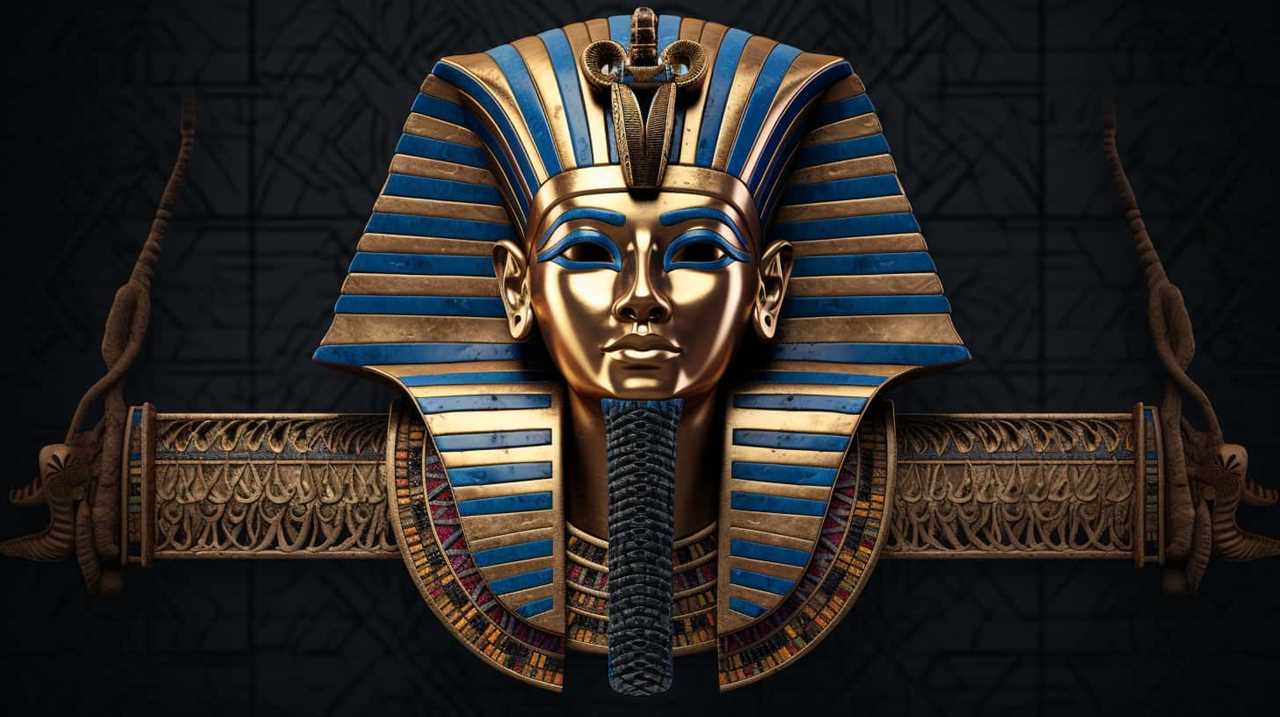
- Eternal Guardians of Mysteries:
- The Sphinx stands as a testament to the timeless pursuit of knowledge.
- Its inscrutable gaze beckons us to uncover the secrets of the past.
- Unveiling the Truth Within:
- Through deciphering hieroglyphic messages, we gain access to the ancient wisdom embedded in the Sphinx’s engravings.
- The historical symbolism of this iconic figure reveals profound insights about life, death, and the human condition.
The Magic of the Ankh
Rarely do we encounter an ancient Egyptian symbol as powerful and enigmatic as the Ankh. The Ankh, also known as the Key of Life, is a symbol that holds deep significance in Egyptian culture. It is believed to represent eternal life and immortality, making it one of the most revered symbols in ancient Egypt.
The symbolism of the Ankh is multi-faceted and rich in meaning. Its looped top represents the eternal cycle of life, while the vertical line represents the path of the soul. Together, they symbolize the union of opposites, the balance between life and death, and the eternal nature of the soul.
In Egyptian mythology, the Ankh was often associated with gods and goddesses, who were believed to hold the power of life and death. It was also believed to be a talisman that could bring protection, good fortune, and fertility to its wearer.
To better understand the symbolism of the Ankh, let us explore its various meanings and interpretations in the table below:

| Symbolism | Meaning |
|---|---|
| Eternal Life | Represents the concept of life beyond death |
| Balance | Symbolizes the harmony between opposites |
| Fertility | Associated with the power of creation and reproduction |
As we delve deeper into the mysteries of ancient Egypt, the Ankh continues to captivate us with its magic and profound symbolism. It serves as a reminder of the enduring legacy and wisdom of this ancient civilization.
Embracing the Eye of Horus
When exploring the captivating world of Egyptian hieroglyphic sayings, one can’t overlook the significance of embracing the Eye of Horus. This ancient symbol holds deep symbolic meaning, representing protection, healing, and intuition.
Horus, the falcon-headed god, is revered as a powerful and watchful deity, making the Eye of Horus a potent talisman to embrace and invoke.
Understanding the cultural significance of this symbol allows us to delve into the rich tapestry of Egyptian beliefs and traditions.
Symbolic Meaning of Eye
We are fascinated by the Symbolic Meaning of the Eye, as it encompasses the embrace of the Eye of Horus. The ancient Egyptians attributed great symbolic significance to the eye, believing it to be a powerful symbol of protection, healing, and knowledge. The mythological origins of this symbolism can be traced back to the Eye of Horus, a symbol of the god’s all-seeing power and divine protection.
The Eye of Horus represents clarity and vision, serving as a reminder to seek wisdom and enlightenment. It symbolizes the concept of ‘utchat,’ or the eye of Ra, which was believed to bring protection against evil forces and ward off negative energy.
Understanding the symbolic meaning of the eye allows us to delve deeper into the rich cultural and spiritual traditions of ancient Egypt, unlocking valuable insights into their worldview and beliefs.
Horus as Protective Deity
As believers in the power of ancient Egyptian hieroglyphic sayings, we embrace the protective deity Horus and his association with the Eye of Horus. Horus, often depicted as a falcon-headed god, was one of the most significant deities in the ancient Egyptian pantheon. He was considered the protector and ruler of Egypt, embodying the divine kingship.
Horus’ association with the Eye of Horus adds to his protective role. The Eye of Horus symbolizes royal power, health, and prosperity. Amulets in the shape of the Eye of Horus were worn by both the living and the deceased as a means of protection. These amulets were believed to ward off evil and ensure the wearer’s well-being.
The symbolism of the falcon and the significance of amulets connected to the Eye of Horus demonstrate the enduring belief in Horus as a powerful guardian and protector.
Cultural Significance of Eye
Continuing our exploration of the cultural significance of the Eye of Horus, we delve into its embrace as believers in the power of ancient Egyptian hieroglyphic sayings. The Eye of Horus holds deep cultural symbolism and carries a profound historical interpretation.
The Eye of Horus embodies protection and healing, offering a sense of security and warding off evil forces. It symbolizes the watchful and compassionate eye of a god, providing guidance and wisdom to those who seek it.
The Eye of Horus also represents the concept of resurrection and eternal life. It signifies the cyclical nature of existence, reminding us that life and death are intertwined, and that death is merely a transition to a different state of being.
Understanding the cultural symbolism and historical interpretation of the Eye of Horus allows us to appreciate its significance as a powerful symbol in ancient Egypt. It serves as a reminder of the profound beliefs and values held by the ancient Egyptians, and continues to inspire and captivate us today.
The Balance of Isfet and Ma’at
Exploring the delicate equilibrium between Isfet and Ma’at, we delve into the ancient Egyptian belief system. The importance of balance was a central concept in their worldview, as they sought to maintain harmony in all aspects of life. Isfet, representing chaos, disorder, and injustice, was seen as the antithesis of Ma’at, which symbolized order, balance, and justice.
To understand Isfet and Ma’at, one must grasp the fundamental principles that guided ancient Egyptians. Isfet was associated with actions and behaviors that disrupted the natural order of the universe. It represented negative qualities such as violence, dishonesty, and greed. Ma’at, on the other hand, encompassed positive attributes like truth, harmony, and righteousness. It was believed that upholding Ma’at ensured the smooth functioning of the world and the well-being of individuals.
Maintaining the balance between Isfet and Ma’at was vital for the Egyptians. They believed that if Isfet gained dominance, chaos would prevail, leading to disasters and calamities. Therefore, individuals were expected to live their lives in accordance with Ma’at, striving to uphold its principles in their thoughts, words, and actions.
Rebirth Through the Scarab Beetle
The Scarab Beetle symbolizes rebirth in ancient Egyptian hieroglyphic sayings. The ancient Egyptians believed that the scarab beetle, also known as the dung beetle, represented the cycle of life and death. This symbolism can be seen in various aspects of their culture and religious beliefs.
The scarab beetle’s behavior of rolling dung into a ball and burying it in the ground was seen as a representation of the sun’s daily journey across the sky. Just as the sun would disappear at night and rise again in the morning, the scarab beetle would emerge from the ground, symbolizing rebirth and renewal.
The scarab beetle also played a significant role in the afterlife beliefs of the ancient Egyptians. They believed that the beetle was associated with the god Khepri, who was responsible for the creation and renewal of life. The scarab amulets, often placed on the mummified bodies of the deceased, were believed to provide protection and ensure a successful journey into the afterlife.
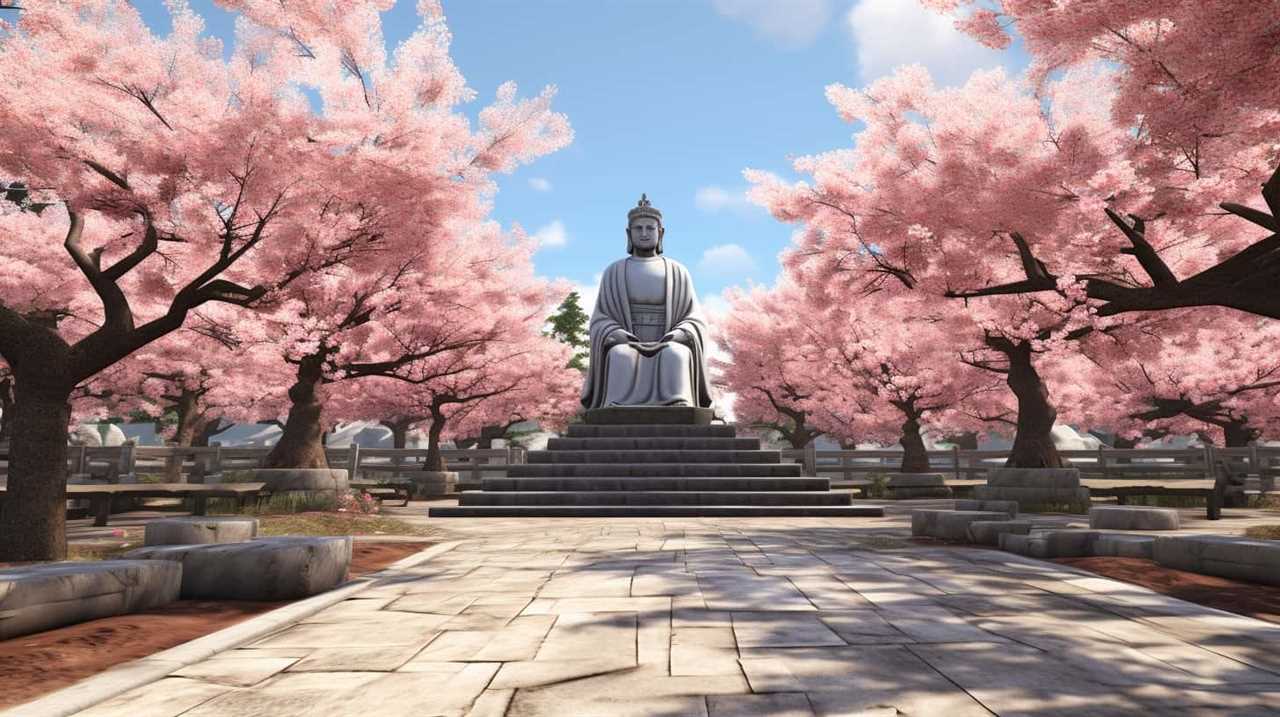
In addition to its symbolism of rebirth, the scarab beetle also represented fertility and regeneration. The Egyptians believed that the beetle possessed the power to bring about new life and restore what was lost. This belief in the scarab beetle’s ability to bring about renewal and transformation is a testament to the profound impact it had on ancient Egyptian beliefs.
Respecting the Divine Pharaoh
As we delve further into ancient Egyptian hieroglyphic sayings, it is evident that our reverence for the Divine Pharaoh is paramount. The Egyptians believed that the Pharaoh was not just a mortal ruler, but a divine being with a direct connection to the gods. This belief was deeply ingrained in their society and shaped their rituals and customs.
To demonstrate the importance of respecting the Divine Pharaoh, let us examine some hieroglyphic sayings that highlight this reverence:
| Hieroglyphic Saying | English Translation |
|---|---|
| 👑👁️👑 | The Pharaoh is the all-seeing eye of the gods. |
| ⚡🌞⚡ | The Pharaoh is the powerful sun, radiating divine energy. |
| 🌺👑🌺 | The Pharaoh is the beautiful flower, blooming with divine grace. |
| 🌍👑🌍 | The Pharaoh is the earth itself, guiding and protecting his people. |
| ⚖️👑⚖️ | The Pharaoh is the just balance, ensuring harmony and order in the kingdom. |
These sayings reveal the Egyptians’ deep respect for their divine ruler. They saw the Pharaoh as the embodiment of the gods on Earth, responsible for maintaining the balance between the mortal and divine realms. Through ancient rituals and ceremonies, they sought to honor and appease the Pharaoh, believing that his favor would bring prosperity and protection to the kingdom.
Understanding the significance of these hieroglyphic sayings allows us to gain insight into the ancient Egyptians’ mindset and worldview. It highlights the central role played by the Divine Pharaoh in their society and underscores the importance they placed on maintaining a harmonious relationship with their ruler.
The Eternal Flame of Ra
Continuing our exploration of ancient Egyptian hieroglyphic sayings, let’s delve into the captivating realm of ‘The Eternal Flame of Ra’. In ancient religious practices, the solar deity Ra held a significant place of reverence and worship. The Eternal Flame of Ra symbolized the eternal power and presence of this mighty deity.
Here are two sub-lists that will surely evoke emotions in our audience:
- The Divine Light:
- The Eternal Flame of Ra represents the divine light that illuminates the world, bringing warmth, life, and energy to all living beings.
- This sacred flame is believed to be the embodiment of Ra’s eternal power, radiating brilliance and providing spiritual guidance to the ancient Egyptians.
- The Cycle of Life:
- The Eternal Flame of Ra also symbolizes the cyclical nature of life, mirroring the rising and setting of the sun each day.
- Just as the sun rises and sets, the flame of Ra represents the eternal cycle of creation, death, and rebirth, reminding us of the impermanence of all things.
Understanding the significance of the Eternal Flame of Ra allows us to gain deeper insight into the ancient religious practices of the Egyptians. It reminds us of their profound connection to the sun and their belief in the eternal power and presence of the solar deity.
Frequently Asked Questions
How Were Hieroglyphics Deciphered and What Methods Were Used?
To decipher hieroglyphics, we utilized various methods such as the Rosetta Stone and the work of key figures like Jean-François Champollion. By comparing known languages, we identified phonetic and symbolic elements, unlocking the secrets of ancient Egypt’s written language.
Are There Any Hieroglyphic Sayings That Are Still Considered Undeciphered or Mysterious?
Undeciphered hieroglyphic sayings and mysterious hieroglyphic phrases continue to captivate scholars. Despite our best efforts, these enigmatic messages remain elusive, shrouded in the ancient secrets of the Egyptian civilization.
Can You Provide Examples of Hieroglyphic Sayings That Have Been Widely Used in Ancient Egyptian Culture?
Examples of widely used hieroglyphic sayings in ancient Egyptian culture include phrases like "life, prosperity, and health" and "eternal life." These sayings were deciphered using methods such as the Rosetta Stone and the work of Champollion.
What Role Did Hieroglyphic Sayings Play in Ancient Egyptian Religious Practices?
Hieroglyphic sayings played a pivotal role in ancient Egyptian religious practices. They were not only a form of artistic expression, but also held deep significance in the literature of the time.
Are There Any Hieroglyphic Sayings That Have Been Found to Have Multiple Interpretations or Meanings?
Multiple interpretations and meanings are common in hieroglyphic sayings. The complexity and symbolism of the ancient Egyptian language allow for various understandings, adding depth to the study of hieroglyphics.
Are the Deciphered Egyptian Hieroglyphic Sayings Similar to the Translated Mesopotamian Clay Tablet Inscriptions?
The deciphered Egyptian hieroglyphic sayings are not exactly similar to translating Mesopotamian clay tablet inscriptions. While both involve unraveling ancient texts, the languages, writing systems, and cultural contexts are distinct. The Egyptian hieroglyphs are pictorial, while Mesopotamian cuneiform uses wedge-shaped characters. Each presents unique challenges to translators.
Can the Deciphering of Nietzsche Morality Quotes Provide Insight into Deciphering Egyptian Hieroglyphic Sayings?
The study of Nietzsche morality quotes decoded can provide valuable insight into deciphering Egyptian hieroglyphic sayings. Both involve the interpretation of philosophical and cultural symbols, and understanding one can enhance the understanding of the other. The process of decoding one can inform and enrich the process of decoding the other.
Conclusion
In the majestic tapestry of ancient Egypt, the hieroglyphic sayings serve as hidden gems of wisdom, guiding us through the complexities of life. Like the sacred Nile, they flow with the power of Ma’at, illuminating the path of our life’s journey.
They reveal the profound knowledge held by the Sphinx, the magic woven into the Ankh, and the eternal flame of Ra. Through the scarab beetle, we learn the beauty of rebirth, while the divine pharaoh teaches us the importance of respect.
These hieroglyphic sayings are a treasure trove of enlightenment, waiting to be unraveled by those who seek the secrets of Egypt’s ancient past.
Lauren’s talent in writing is matched by her passion for storytelling. Her love for books and deep understanding of culture and entertainment add a distinct flavor to her work. As our media and press contact, Lauren skillfully bridges the gap between afterQuotes and the broader media landscape, bringing our message to a wider audience.
-

 Funerals Quotations3 months ago
Funerals Quotations3 months agoSoothing Hope Quotes for Funeral Reflections
-

 TV Shows Quotations2 months ago
TV Shows Quotations2 months agoTop 4 Unforgettable TV Drama Monologues
-

 Movies Quotations4 weeks ago
Movies Quotations4 weeks agoUnforgettable Cult Movie Quotes: A Compiled List
-

 Education and Knowledge1 week ago
Education and Knowledge1 week agoUnlock Success with the Best Study Motivation Quotes
-

 Travel and Exploration Quotations3 weeks ago
Travel and Exploration Quotations3 weeks agoWisdom on Waves: Notable Maritime Explorer Quotations
-

 Education and Knowledge1 week ago
Education and Knowledge1 week agoBest Study Quotes: Unlock Student Potential!
-

 Military Quotations2 months ago
Military Quotations2 months agoInspiring Military Quotations for Strength & Honor
-

 Travel and Exploration Quotations3 weeks ago
Travel and Exploration Quotations3 weeks agoWhy Travel Teaches Unforgettable Life Wisdom?


















